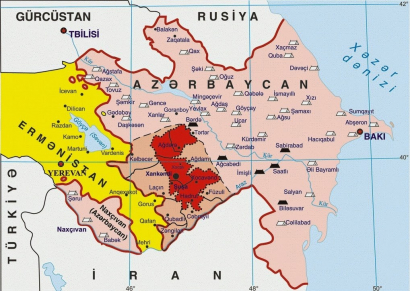New aspects of territorial integrity in present-day world

Territorial struggle is a basic background for the establishment and development of international relations. Land resources were completely divided at early XX century. Attempts to re-divide those lands at a global scale caused the two world wars. As a result of these wars there was formed such an opinion that it was inadmissible to draw new boundaries through acts of force. Of course, this opinion doesn't guarantee the non-occurrence of new conflict hotbeds. In international law and international relations theory, the territory is a main symbol of a state and all creatures including human beings have an instinctive right to defend the territory that they possess.
From the book 'Territorial factor in interstate conflicts'
Khagan Mammadov
As is well known, the contemporary international law, fundamental principles of which are stated in the Charter of the United Nations, prohibits the use of military forces against the sovereignty, territorial integrity of States, and considers the armed aggression as the grave international crime. Although the international law prohibits war as a means of settling disputes between States, legal prohibition of war does not mean that there are no states that wish to settle a conflict through military forces in their own favour.
There is no universal model for settling national problems in poly-ethnic states in the context of globalization. International documents only determine general aspects. A multi-ethnic state is viable only if the representatives of all ethnic groups live a fulfilled life, and this factor in fact is connected with the economic situation of the State. Each state must be the common home for all ethnic, religious and racial minorities. However, at the present stage through creation of a "purified" mono-ethnic state for each ethnic group, it is impossible to settle their problems.
Currently in democratic western states national problems are settled primarily through individual guarantees of rights of individuals and collective rights of ethnic groups, administrative division, as a rule, is not related to the territorial dispersion of these groups. Therefore, the question of "historical borders" of ethnic groups doesn't arise, in itself it is dead issue and is only able to breed conflicts.
Supremacy of human rights, rights of individuals becomes the starting point for emerging global security system under the influence of new realities - the collapse of the bipolar world and the end of the 'cold' war. The Charter for European Security adopted at the OSCE Summit in Istanbul (18-19 November 1999) contains provisions aimed at improving the protection of the rights of national minorities: "Full respect for and observance of human rights including the rights of persons of national minorities, rather strengthen the territorial integrity and sovereignty, rather than undermine them... With a view to strengthening the protection of civilians during the conflict, we will explore ways to improve the international humanitarian law application ".
The terms according to which the right to self-determination,
at root, are restricted and cannot include the dismemberment of states, violation of territorial integrity and political unity of a state - it is the existence of a "Government representing the whole nation belonging to the given territory without distinction of race, religious confession or colour".
The World Conference on Human Rights held in Vienna, Austria, on 14 to 25 June 1993, adopted statements reflecting on the one hand the importance of the realization of the right to self-determination in the context of respect for human rights, and on the other hand urging to put an end to destabilizing effects associated with ethnic and national problems. The most varied forms of national-cultural autonomy are enough spread experience throughout the world. This kind of autonomy gives an opportunity to save the ethnic identity of any given nations, to resolve the development issues, religion, culture, language and education.
Autonomy in many cases takes the form of a national-territorial statehood, and in observance of human rights and interests of national minorities, creates opportunities to address the issue of their development.
The United Nations General Assembly Declaration on the Rights of Persons Belonging to National or Ethnic, Religious and Linguistic Minorities dated December 18, 1992 states: "Nothing in this declaration may be interpreted as permitting any activity contrary to the purposes and principles of the United Nations, including sovereign equality, territorial integrity and political independence of States".
The similar viewpoints were stated in the 'Framework Convention for the Protection of National Minorities', adopted in Strasbourg on April 18, 1995: "Nothing in the present framework Convention shall be interpreted as implying any right to engage in any activity or perform any act contrary to the fundamental principles of international law and in particular of the sovereign equality, territorial integrity and political independence of States.".
The concept of sovereign equality in the current stage includes the following elements: 1) All states are juridically equal; 2) Each State enjoys the rights inherent in full sovereignty; 3) Each State has the duty to respect the personality of other States; 4) The territorial integrity and political independence of the State are inviolable; 5) Fulfilment in good faith of international obligations;
All the above-mentioned principles underlying international relations, should contribute to the prevention of international conflicts based on territorial claims.
According to the principle set up in the final act of the Conference on Security and Co-operation in Europe in 1975 " The participating States regard as inviolable all one another's frontiers as well as the
frontiers of all States in Europe and therefore they will refrain now and in the future from assaulting these frontiers."
On August 7, 1993 and August 15, 1994 the CIS countries signed Declarations on the Inviolability of State Borders and on respect for the Sovereignty, Inviolability of National Frontiers and Territorial integrity of States Members of the Commonwealth. Thus, in accordance with the modern aspects of international relations, every state shall respect the established boundaries of another foreign state. However, after the fall of the Berlin Wall in many parts of the former Soviet and post-Soviet States inter-ethnic, inter-religious conflicts broke out. Contrary to the achieved agreements, territorial claims were put forward; massive and gross human right violations (aggression, forcible expulsion from their homes, vandalism, destruction of cities and settlements, etc.) happened. The aggressor states try to justify their applied criminal acts to achieve their goals by using the principle of respect for human rights and fundamental freedoms for the extension of unreasonable demands on the realization of rights to self-determination in its most extreme form.
On June 17, 1998 the Rome Statute of the International Criminal Court was adopted at diplomatic conference. According to the Statute, genocide, crimes against humanity (deportation, forcible transfer of civilians, torture, murdering perpetrated against the civilian population, etc.), war crimes and aggression are attributed to the international criminal jurisdiction. All these international crimes are usually committed with the aim of territorial claims, often under the pretext of self-determination of nations.
However, according to the UN Charter (Art. 1, paragraph. 2; Art. 55, 73, 76), the principle of equal rights and self-determination of nations shouldn't work to the detriment of the territorial integrity and political unity of states that observe and ensure the representation of all segments of the population in public authorities, without any discrimination.
Thus, the function of the principle of the sovereign equality of states and the principle of territorial integrity in the context of emerging post-bipolar non-confrontational structure of international relations is that the principle of sovereign equality is the optimal basis for partnership and constructive interaction among states, with which territorial claims are incompatible either by peaceful or military means.
AND OTHER...
-
 Translation Centre’s Book in the Top List of the International Book Fair
Translation Centre’s Book in the Top List of the International Book Fair
The book “The Second Life of the Legend” by Elvira Arasly, the popular children’s writer, published within the joint project of the Azerbaijan State Translation Centre...
-
 Khagani Shirvani’s Creativity on the Literary Portal of England
Khagani Shirvani’s Creativity on the Literary Portal of England
“Write Out Loud”, the leading poetry portal of England, has posted in English the ghazal “A Love Song” by the great Azerbaijani poet Khagani Shirvani as part of the...
-
 Isi Malikzade’s Creativity on German Literature Magazine
Isi Malikzade’s Creativity on German Literature Magazine
LESERING.de, a popular German e-literature magazine, has posted in German the short story Salt by Isi Malikzade, the notable Azerbaijani writer, as part of the AzSTC project “Azerbaijan Literature in an International Virtual World”.









